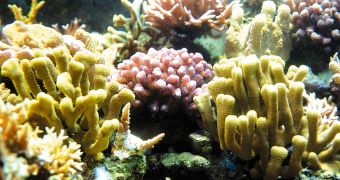Corals may be simple little sea creatures that form magnificent reefs in the tropical waters, but scientists were shocked to discover more genes in them than in humans! ...
Moreover, even if they are at the base of animal evolution, corals share with people a lot of the immune system genes, and as corals are much older than mammals, it seems logical that they keep the ancestral stock. "Corals are among the simplest animals in the world - yet they may possess a set of genes as large and complex as our own," said Professor David Miller of the ARC Centre of Excellence in Coral Reef Studies and the ARC Special Research Centre for the Molecular Genetics of Development. "Based on the rate of gene discovery, we estimate that corals have as many as 20 or 25,000 genes, compared with the human complement of 20-23,000."
This gene richness is a huge enigma, but has many evolutionary implications, and could explain the emergence of the nervous and immune systems in vertebrates.
10 - 12 % of the already described coral genes are also found only in vertebrates (and are presumably lost in other animal groups) like those involved in the development of nerves, vision, DNA imprinting, stress responses and main immune system proteins. "We have been amazed at how many of the genes involved in innate immunity in man are present in coral - and just how similar they are", Miller said.
The complex immune system of the corals helps in fighting against many coral pandemics: 'black band', 'white plague', 'white pox' 'white syndrome' or 'white band'. "How corals cope with the worldwide upsurge in diseases, and the extent to which they are affected by other stresses caused by human activity are important questions. The similarity of the coral and human innate immune repertoires implies that they may function in similar ways, so the hope is that we can apply what we know about human health to better understand coral disease. By exploring the ancestral immune genetic repertoire of corals and how it functions in a simple animal, we will gain new insights which will help in the battle against human disease," added Miller.
The finding also sheds a new light on evolution: gene loss. Many groups, especially those with fast generation turnover (like insects) lost genes extremely rapidly.
Corals mature in at least 5 years, compared to 304 weeks in the case of the the fruitfly, thus they may be storing many ancestral genes. But while their complex genome produces just 12-14 types of body cells, in humans, less genes develop thousands of distinct cell types.
Miller believes that coral genes interact with each other in a much simpler manner than in the case of the vertebrates.
Anyhow, current types of corals emerged 240 million years ago; the first humans separated from chimpanzees 4 million years ago, 2 % compared to the evolution of modern corals. Even so, "There is no project to sequence the coral genome, in spite of the tremendous benefits to medicine and other branches of science such a project would offer", Miller said.

 14 DAY TRIAL //
14 DAY TRIAL //